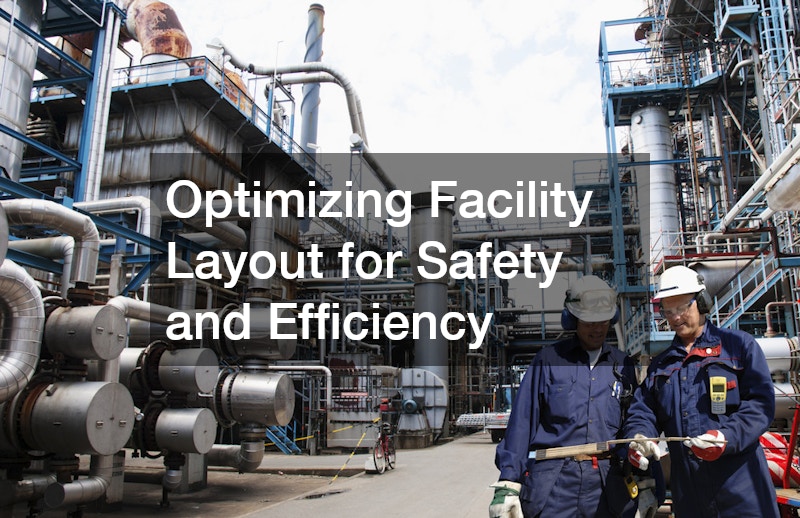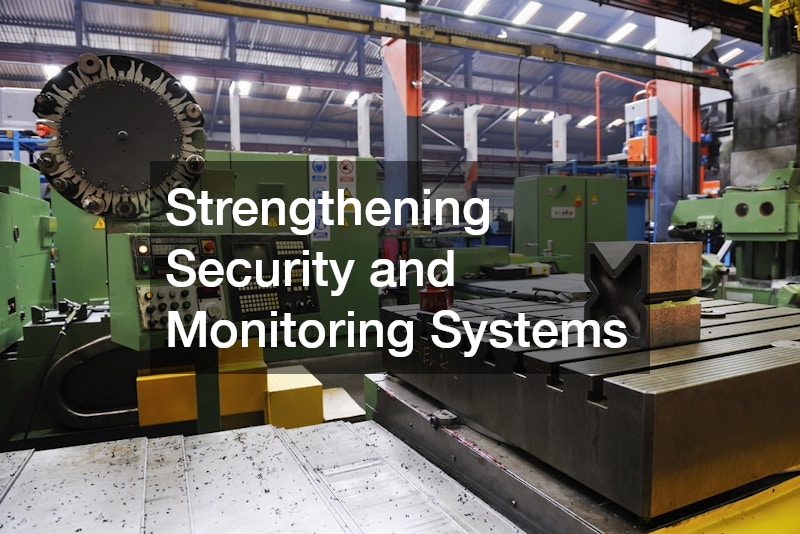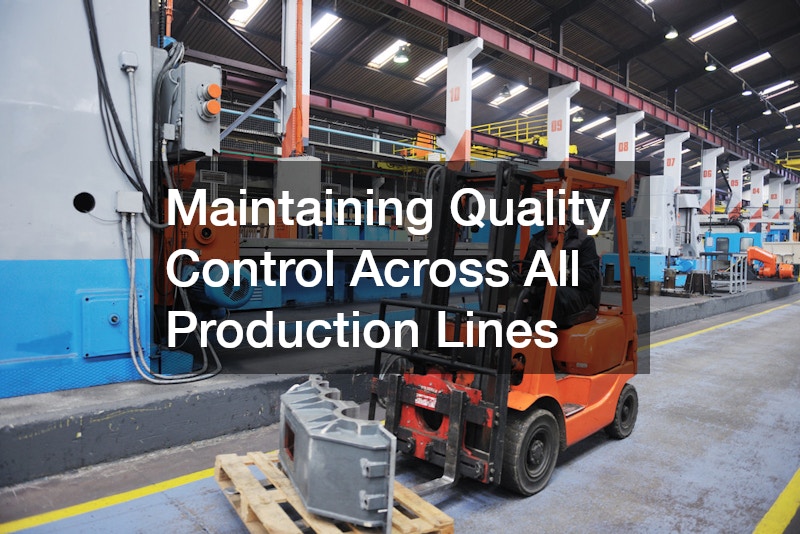Managing a large factory requires careful coordination, precise planning, and a deep understanding of logistics. Every department, from production and safety to supply chain management, must work in harmony to ensure operations run smoothly and efficiently. The complexity of overseeing such a vast system means that small inefficiencies can quickly lead to costly delays or safety risks. To keep everything running at peak performance, factory managers must balance speed with quality, while also prioritizing sustainability and worker well-being. With the right systems and infrastructure in place, even the largest manufacturing facilities can operate with the precision and reliability needed to meet global demand.
Optimizing Facility Layout for Safety and Efficiency
One of the first steps in managing a large-scale manufacturing facility is designing an efficient and safe layout. The physical arrangement of production areas, storage zones, and employee pathways has a direct impact on productivity and workflow. An organized layout reduces travel time between stations, minimizes the risk of accidents, and allows employees to perform tasks more comfortably. Safety and efficiency should always go hand in hand, as a well-planned workspace not only boosts output but also promotes a culture of responsibility and awareness among the workforce.
Installing a commercial epoxy floor can significantly contribute to both safety and operational performance. These floors are known for their durability, slip resistance, and ease of maintenance, making them ideal for high-traffic industrial environments. The smooth surface also facilitates the movement of heavy machinery, forklifts, and workers without causing excessive wear or dust buildup. Epoxy flooring can be color-coded to designate walkways, loading zones, and restricted areas, improving organization and visual safety cues. This small yet impactful upgrade supports a cleaner, safer, and more efficient working environment, which is vital for large-scale operations.
Implementing Sustainable Practices for Waste Reduction
Waste management is one of the most important logistical challenges in factory operations. Without proper systems in place, manufacturing waste can quickly accumulate, leading to inefficiencies, regulatory violations, and environmental harm. A sustainable waste management plan not only reduces environmental impact but also saves money by reusing materials and minimizing disposal costs. Implementing waste reduction strategies can enhance a company’s reputation and contribute to long-term operational resilience.
Utilizing the right waste equipment ensures that factories can manage byproducts and scrap materials efficiently. This equipment includes compactors, balers, and shredders that allow for easy sorting, recycling, and disposal of waste generated during production. By integrating these machines into daily operations, factories can reduce landfill use, recover valuable materials, and maintain a cleaner, safer workspace. Waste management equipment also supports compliance with environmental regulations, ensuring that production remains responsible and sustainable. In a large factory setting, effective waste handling is not just an environmental duty—it’s a key element of operational logistics.
Strengthening Security and Monitoring Systems
Security is an essential element of managing any large manufacturing facility. With hundreds of employees, valuable machinery, and sensitive materials on-site, protecting assets and maintaining controlled access is crucial. A comprehensive security system not only prevents theft and unauthorized entry but also enhances worker safety by monitoring for potential hazards. Modern security systems integrate surveillance, access control, and automated alerts, providing managers with real-time visibility into all areas of the factory. This level of control allows quick responses to incidents and ensures that daily operations remain secure and compliant.
Installing access control installation services helps large factories regulate who can enter specific zones within the facility. These systems may use keycards, biometric scanners, or coded entries to manage access levels based on employee roles. For example, only trained technicians may be permitted in high-voltage areas or near hazardous materials. In addition to improving physical security, access control systems provide digital logs that help track employee movement, making audits and safety reviews easier to perform. Integrating these services with surveillance and alarm systems adds another layer of protection, ensuring the factory remains safe, efficient, and fully monitored at all times.
Integrating Automation for Faster Production Output
Automation has become the cornerstone of modern manufacturing logistics. Incorporating advanced technology into production lines allows factories to achieve higher levels of precision, consistency, and speed. Automated systems reduce human error, lower labor costs, and improve quality control. They also enable real-time monitoring and data collection, which can help managers identify inefficiencies and optimize production schedules. The transition to automation requires strategic investment and training, but once implemented, it greatly enhances both productivity and profitability.
Using robotic fabrication systems allows factories to perform repetitive or complex tasks with incredible precision and efficiency. Robots can handle welding, assembly, material handling, and packaging operations around the clock, increasing output while minimizing downtime. These systems can also adapt to design changes quickly, making production more flexible in fast-changing markets. In addition, robotic fabrication improves workplace safety by reducing direct human involvement in hazardous tasks. For large factories looking to scale their operations, investing in automation provides a powerful competitive advantage that drives consistent and reliable growth.
Maintaining Quality Control Across All Production Lines
In large-scale manufacturing, maintaining consistent product quality across multiple lines and shifts can be challenging. Variations in materials, equipment performance, or operator technique can lead to defects that affect profitability and brand reputation. To ensure high standards, factories must implement rigorous quality control protocols that monitor every stage of production. These systems detect issues early, reducing waste and ensuring that every finished product meets company specifications. Quality assurance isn’t just a process—it’s an ongoing commitment that keeps production aligned with customer expectations.
Partnering with experts in record master manufacturing can help factories develop and maintain efficient quality control systems. These professionals specialize in setting up standardized recording and reporting methods for production data, allowing teams to identify performance trends and spot inconsistencies before they become problems. With reliable data collection and documentation, managers can make informed decisions about workflow adjustments or equipment maintenance. Consistent record-keeping also supports compliance with industry regulations and certifications. For large factories, a well-structured quality management system is the key to sustaining excellence and customer satisfaction over time.
Partnering With Specialized Contractors for Precision Work
Large factories rely on a mix of internal teams and external partners to keep operations running smoothly. While the in-house workforce handles day-to-day tasks, specialized contractors often bring in the technical expertise required for precision work. Partnering with experts who understand the unique demands of industrial environments ensures that every component is crafted with accuracy and built to last. This collaborative approach allows factories to access cutting-edge skills and technology without having to expand their internal teams unnecessarily.
Working with custom metal fabrication companies can be especially valuable when producing complex parts or machinery components. These specialists have the tools and experience needed to create precise metal structures that meet specific strength and tolerance requirements. From conveyor systems to custom fixtures, metal fabricators provide durable solutions tailored to a factory’s workflow and machinery layout. Outsourcing such specialized work allows manufacturers to focus on their core production while ensuring every piece of equipment is engineered for long-term reliability. By maintaining close partnerships with skilled fabricators, factories can streamline project timelines and improve overall production efficiency.
Streamlining Transport and Storage Processes
Managing the flow of materials is a cornerstone of large-scale manufacturing logistics. A well-organized transport and storage system ensures that raw materials arrive on time, finished goods move efficiently, and warehouse space is used effectively. When materials or products are delayed or misplaced, it can create bottlenecks that disrupt the entire production chain. To prevent this, factories must invest in structured material handling systems and technologies that provide visibility into the movement and status of goods at all times.
Integrating bulk material handling equipment into daily operations can dramatically enhance workflow efficiency. This includes conveyors, silos, hoppers, and automated loaders that transport materials safely and consistently throughout the facility. By reducing manual labor and improving speed, these systems minimize downtime and ensure that production lines never run short of essential resources. They also reduce the risk of workplace injuries by limiting the need for heavy lifting or repetitive strain tasks. Implementing advanced material handling solutions enables factories to manage large quantities of product while maintaining precision and reliability across every stage of production.
Ensuring Tool Reliability and Productivity on the Floor
Every successful factory depends on tools and machinery that operate consistently under demanding conditions. Even minor equipment malfunctions can cause major production delays or safety issues. Regular maintenance, calibration, and inspections are essential to keeping operations on schedule. A well-maintained tool inventory ensures that employees can perform tasks efficiently without interruptions, while also reducing replacement costs and prolonging the lifespan of expensive machinery. Investing in reliable tools is an investment in the factory’s long-term success.
Sourcing high-quality tools from air feed drill suppliers is one way factories can maintain dependable performance. Air feed drills are commonly used in precision drilling applications where accuracy and repeatability are critical. Working with trusted suppliers ensures that equipment is durable, safe, and capable of handling continuous industrial use. Reliable tools not only improve production speed but also help maintain consistent quality across large batches of products. When factory managers prioritize equipment reliability, they reduce downtime and create a more stable and productive manufacturing environment.
Investing in Advanced Machining for Complex Manufacturing
As manufacturing continues to evolve, advanced machining has become essential for creating high-precision components used in complex products. From aerospace to automotive industries, precision machining ensures that every part meets exact specifications and tolerances. Utilizing cutting-edge equipment reduces material waste, boosts production speed, and allows manufacturers to handle more intricate projects. For large factories, adopting modern machining technologies means staying competitive in a rapidly changing industrial landscape.
Working with experts in swiss cnc machining can provide factories with the ability to produce extremely detailed and accurate parts at scale. Swiss CNC machines are designed for high-speed, high-precision work, making them ideal for small, intricate components that require consistent quality across large batches. These machines can operate with minimal supervision, reducing labor costs and improving efficiency. By integrating CNC technology into their production process, manufacturers can achieve greater flexibility, meet tighter deadlines, and deliver superior results that meet industry and client standards.
Managing Fleet Operations and Logistics Support
Transportation and logistics are vital components of running a large factory efficiently. Whether it involves moving materials between facilities, delivering finished goods, or servicing company vehicles, effective fleet management ensures that production never slows down. A dependable logistics system keeps operations on schedule and supports the seamless movement of goods across supply chains. For many factories, maintaining a fleet of vehicles and the right accessories is just as important as managing the production floor itself.
Equipping vehicles with durable truck accessories can make a big difference in fleet performance and safety. Accessories such as toolboxes, lift gates, racks, and protective liners improve functionality and reduce wear on company vehicles. These additions allow workers to transport tools and equipment securely, keeping everything organized and minimizing downtime caused by missing or damaged parts. By customizing their fleets to meet specific operational needs, factory managers can ensure more efficient transport, better safety compliance, and longer vehicle lifespan. Logistics optimization is a critical step in managing the broader infrastructure of any large manufacturing operation.
Managing the logistics of a large factory requires a balance of efficiency, safety, and innovation. Every aspect—from floor layout to material handling—plays a vital role in keeping operations streamlined and profitable. When factory leaders invest in durable infrastructure, sustainable practices, and reliable equipment, they set the foundation for long-term growth and stability. Strategic planning, automation, and data-driven decision-making help reduce waste, lower costs, and improve productivity across every department.
The success of a large manufacturing facility depends on continuous improvement and collaboration. Working with skilled specialists, from custom metal fabrication companies to logistics experts, ensures that every system operates at its highest potential. By embracing modern technology, prioritizing employee safety, and maintaining clear communication between departments, factories can achieve a level of precision and efficiency that sets them apart in today’s competitive industrial world. A well-managed factory doesn’t just meet production goals—it builds a reputation for excellence and reliability that drives future success.





